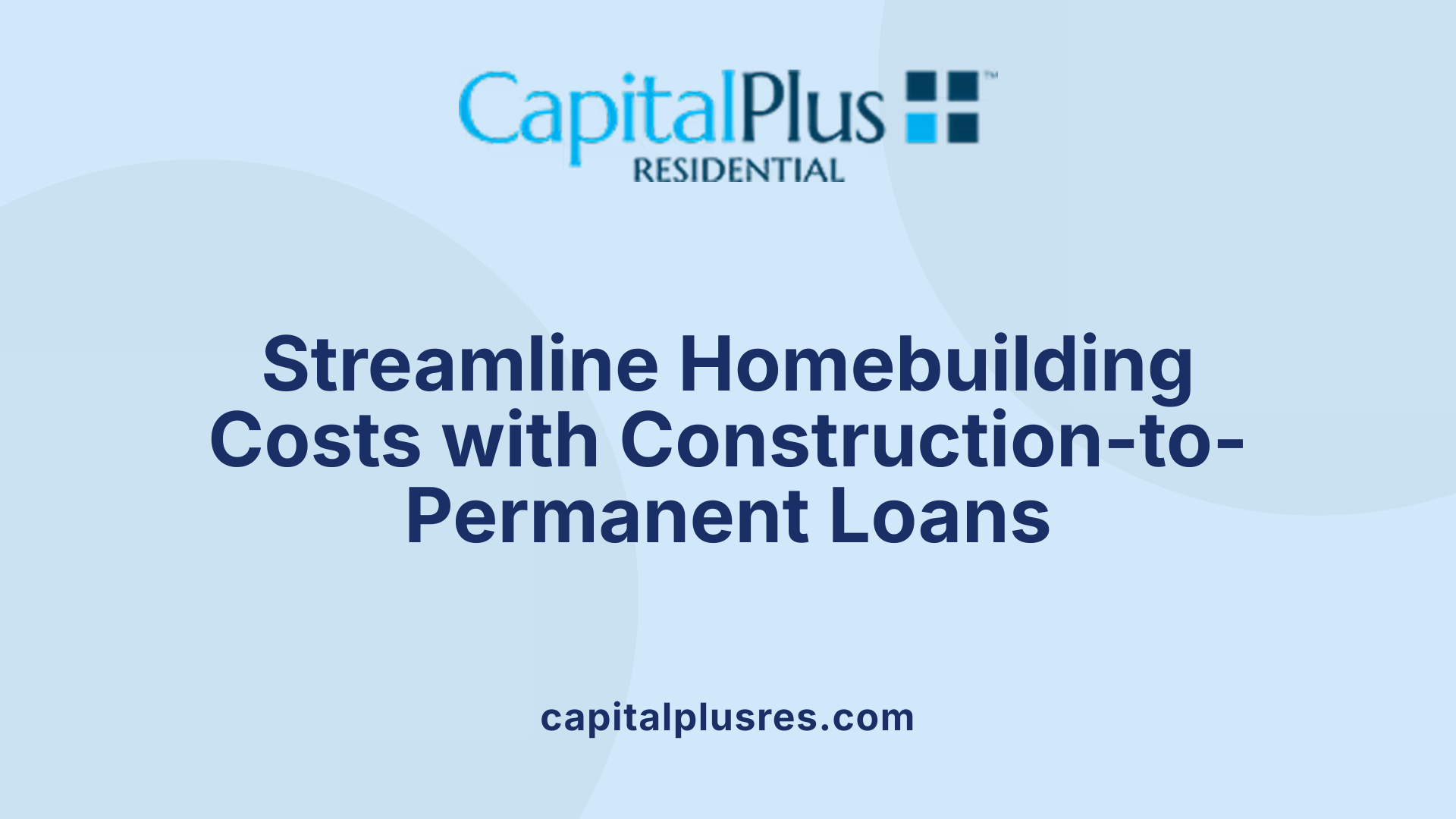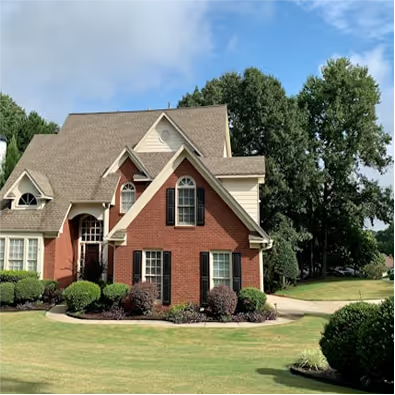Understanding Custom Home Financing
Building a custom home is an exciting yet complex endeavor that requires careful financial planning and knowledge of the various loan options available. From purchasing land to finalizing construction and securing permanent financing, prospective homeowners face multiple challenges. This article explores the key financing options tailored to custom home building, the role of mortgage brokerage services, borrower eligibility assessments, and essential strategies to ensure successful funding throughout the process.
Mortgage Brokerage Services: Bridging Borrowers and Lenders

What are mortgage brokerage services and how do they work?
Mortgage brokerage services act as intermediaries between homebuyers and a wide range of lenders. They help clients find mortgage options tailored to their financial situations by researching and comparing rates, fees, and loan terms. Brokers work with various types of lenders, including wholesale lenders inaccessible directly to the public.
Role of mortgage brokers
Mortgage brokers assist borrowers throughout the home financing journey. They gather necessary documentation, explain legal disclosures, and guide clients through the loan application and closing processes. By handling these tasks, brokers simplify the complex mortgage landscape for buyers.
How brokers facilitate home financing
Rather than lending money themselves, brokers negotiate with lenders on behalf of clients to secure competitive interest rates and favorable loan terms. This service is especially beneficial for borrowers who want to explore multiple lending options without contacting each lender individually.
Broker compensation and benefits
Mortgage brokers typically earn commissions—about 1-2% of the loan amount—paid by the lender once the loan closes. This arrangement usually results in minimal fees for borrowers while providing access to a broader loan market.
Efficiency and transparency in loan sourcing
Using mortgage brokers makes the home financing process more efficient and transparent. Borrowers gain a clearer understanding of available options without excessive legwork, helping them make informed decisions with professional support.
Residential Lending Services: Diverse Options for Homebuyers

What types of residential lending services are available to homebuyers?
Homebuyers have access to a wide variety of residential lending services provided by different types of lenders. Credit unions, mortgage banks, mortgage brokers, and online lenders constitute the primary sources of mortgage financing. Each type offers unique loan products tailored to specific borrower profiles and financial situations.
Lenders offer several mortgage options, such as fixed-rate mortgages, which provide stable monthly payments, and adjustable-rate mortgages, where rates fluctuate over time. Government-backed loans like FHA (Federal Housing Administration) and VA (Veterans Affairs) loans are popular choices for those who qualify as they often require lower down payments and have more flexible credit requirements.
There are also specialized lenders like portfolio lenders, who keep nonconforming loans in-house and may provide loans under less strict guidelines. Wholesale and correspondent lenders operate in the background, funding loans that are sold to other institutions. For real estate investors or borrowers needing quick, short-term financing, private lenders such as hard money lenders provide higher-interest loans with fast approvals.
Ultimately, choosing a lender and mortgage product depends on the borrower's needs, including desired loan terms, interest rates, credit score, and how quickly they need financing. Research and comparison are crucial for finding the best fit in residential lending services.
Construction Loans: Short-Term Financing for Building Your Dream Home

What Are Construction Loans Used For?
Construction loans are short-term financial products designed to cover all expenses related to building a residential home. These costs typically include purchasing land or a lot, contractor labor, building materials, and permits required for construction. Unlike traditional mortgages, construction loans usually do not cover design costs but focus on the actual homebuilding phase.
How Long Do Construction Loans Last and How Are Funds Released?
The typical duration of a construction loan is between 12 to 18 months, matching the expected timeline for building a home. Funds are not released all at once; instead, they are disbursed in stages known as "draws." Each draw corresponds to specific milestones during the construction process, and before each release, professional inspections verify that work has been completed satisfactorily. This staged funding approach helps maintain control over the budget and ensures project progress.
How Do Interest Payments Work During Construction?
During the construction phase, borrowers usually make interest-only payments on the amount of money disbursed so far. This means monthly payments are lower since the principal is not being reduced yet. Interest rates for these loans tend to be variable and slightly higher than those for traditional mortgages due to increased risk, often linked to indices like the prime rate. Once construction is complete, the loan either converts into a permanent mortgage or is paid off, and regular principal and interest payments commence.
What Documentation and Qualifications Are Required?
Obtaining a construction loan requires thorough documentation similar to a mortgage but with added specifics. Borrowers must provide detailed construction plans, realistic budgets, approved contracts, and builder credentials. A minimum credit score often around 620 to 680 is required, alongside a reasonable debt-to-income ratio and a larger down payment, usually around 20-30%. Lenders also expect proof of financial stability through income verification, bank statements, tax returns, and the approval of the chosen builder or contractor. The emphasis is on ensuring the borrower's capability to manage the construction project and repay the loan.
Construction-to-Permanent Loans: Simplifying the Homebuilding Finance Process

How Do Construction-to-Permanent Loans Work?
Construction-to-permanent (C2P) loans are designed to finance the entire homebuilding process seamlessly. They initially provide funds for building your new home, covering costs such as land purchase, contractor labor, materials, and permits. Instead of taking out two separate loans, a C2P loan combines construction financing and a long-term mortgage into a single loan.
What Are Interest-Only Payments During Construction?
During the construction phase, which typically lasts 12 to 18 months, borrowers make only interest payments on the funds disbursed. This interest-only period helps keep monthly payments lower while the home is being built. Funds are released in stages, called "draws," based on verified construction milestones, ensuring budget control and project accountability.
How Does the Loan Automatically Convert to a Permanent Mortgage?
Once construction is complete, the loan automatically converts into a standard mortgage, eliminating the need for a separate loan application and closing. After conversion, payments include both principal and interest based on the terms agreed upon during loan approval. This smooth transition avoids duplication of closing costs and streamlines the financing process.
What Cost-Saving Features Do C2P Loans Offer?
C2P loans reduce overall expenses by providing a one-time close financing option. This means borrowers only have to pay closing costs once, at the beginning of the loan. Additionally, options like rate locking protect against interest rate fluctuations during construction. Some lenders, such as U.S. Bank, offer client credits and other incentives that further reduce closing costs. These benefits make C2P loans an attractive choice for managing all phases of home construction efficiently.
Lot Loans: Financing Land Acquisition for Building

What Are Lot Loans and Why Are They Important?
Lot loans are specialized mortgages designed specifically for purchasing land where a home will eventually be built. Unlike traditional home loans, lot loans focus on financing the acquisition of the land itself, which forms an essential first step in the homebuilding process. Buyers use them when they want to secure a plot before planning construction.
What Are the Typical Interest Rates and Terms?
Lot loans usually come with fixed interest rates initially, providing some stability for borrowers. However, after a predetermined period, these rates commonly shift to variable, often tied to benchmark indices such as the prime rate. This variability in interest rates reflects the higher risk associated with investing in raw land rather than developed property.
What Are Down Payment Requirements for Lot Loans?
Because land loans present greater risk to lenders—mainly due to the lack of immediate income generation or collateral value—borrowers generally must provide larger down payments. Typically, down payments range from 15% to 25% of the land's purchase price, depending on the loan terms and the borrower's financial profile.
How Do Lot Loans Relate to Construction Financing?
Purchasing land with a lot loan often precedes securing a construction loan. While a lot loan finances the land purchase, construction loans cover subsequent expenses like building materials, labor, permits, and contractor fees. Some construction-to-permanent loans may bundle land purchase and construction costs into one loan, but many borrowers benefit from obtaining a lot loan first to separate land acquisition from construction financing.
This separation allows for clearer budgeting and can favorably impact loan qualifications and interest rates. It is crucial for prospective homeowners to consider specific strategies for land financing that align with their construction plans and overall budget.
Qualifications and Documentation Needed for Construction Financing
Credit Score and Income Requirements
To qualify for construction financing, borrowers typically need a minimum credit score of around 620 to 680, depending on the lender and loan type. Besides a strong credit profile, lenders assess income stability and sufficient assets to ensure the borrower can handle payments throughout construction and afterward. Debt-to-income ratios generally must stay below 50%, showing the borrower’s ability to manage current and future debts.
Necessary Documentation Such as Plans and Contracts
Applying for a construction loan requires extensive paperwork. Loan officers review detailed architectural plans, construction contracts, and project budgets. Accurate and comprehensive documentation ensures the lender can evaluate the scope and feasibility of the project. Appraisals reflecting projected property value after construction or renovation are also critical.
Builder Qualifications and Approvals
Lender approval extends to the builder involved in the project. Builders must be licensed, insured, and have a proven track record of completing quality projects. Some loans require proof of builder credentials and sometimes interviews or references. For owner-builders, demonstrating construction expertise and a thorough plan is vital.
Importance of Detailed Budgets and Schedules
A detailed construction budget and timeline are crucial. These documents guide the disbursement of loan funds in stages or 'draws,' aligned with project milestones. They also help lenders control financial risk by ensuring funds are released only after verified work completion. Borrowers benefit by managing costs and avoiding unexpected overruns.
How Do Residential Lending Services Assess Borrower Eligibility?
Residential lending services evaluate eligibility through a comprehensive review of credit scores, income statements, asset reports, and debt obligations. Guidelines such as Fannie Mae’s Eligibility Matrix inform the maximum loan-to-value and combined loan-to-value ratios allowed. These assessments help lenders determine suitable loan conditions, including interest rates and repayment terms, ensuring borrowers meet required mortgage standards.
Managing Costs and Fees in Mortgage Brokerage and Construction Loans
What costs are typically involved in mortgage brokerage services?
Mortgage brokerage services usually include origination fees, which are calculated as a percentage of the loan amount, commonly between 1% and 2%. In some cases, borrowers may also encounter application fees. These costs might be paid upfront at closing or indirectly covered by the lender, often resulting in a higher loan balance or interest rate. Though brokers sometimes charge separate fees, federal regulations cap total broker fees at 3% of the loan amount. Typically, lenders compensate brokers through commissions that may not be directly charged to borrowers; however, borrowers should always request clear disclosures to understand the fees involved.
What are the costs of construction loans including down payments and interest rates?
Construction loans require larger down payments than standard mortgages, often ranging from 20% to 30% due to the higher risk involved. Interest rates on construction loans are generally higher than traditional home loans—typically about one percentage point more—and often variable, fluctuating with indices like the prime rate. During the construction period, borrowers usually make interest-only payments. The loan term is short, commonly 12 to 18 months, with funds released incrementally through draws as construction milestones are met.
How can savings be achieved through construction-to-permanent loans?
Construction-to-permanent loans allow borrowers to finance the construction and automatically convert the loan into a long-term mortgage once the home is complete. This single-close process reduces additional closing costs and simplifies paperwork compared to taking out a separate mortgage post-construction. Borrowers benefit from locking in interest rates during construction and avoid paying multiple sets of fees, helping to save overall costs and streamline financing.
How important is transparency in fee disclosure?
Transparency in disclosing all fees and costs upfront is crucial for borrowers engaging with mortgage brokers and construction loans. Clear communication about the broker’s commission structure, application fees, closing costs, down payment requirements, and loan terms empowers borrowers to make informed decisions and avoid surprises. Borrowers are encouraged to review all documents thoroughly and ask lenders or brokers for detailed breakdowns of any charges related to the loan process.
Benefits of Using Mortgage Brokers Over Direct Lenders in Construction Financing
What are the benefits of using a mortgage broker compared to applying directly with a lender?
Using a mortgage broker offers several advantages for borrowers seeking construction financing. Brokers provide access to a broad network of lenders, enabling borrowers to compare diverse mortgage products, interest rates, fees, and loan terms all in one place. This contrasts with applying directly to individual lenders, which can be time-consuming and limit choice.
Mortgage brokers act as trusted intermediaries. They help navigate the often complex loan documentation, requirements, and approvals involved in construction loans. Borrowers receive personalized guidance tailored to their unique financial situation and project specifics, improving the chances of securing favorable financing.
Additionally, brokers typically facilitate competitive rates and loan terms without adding extra costs to the borrower, as they are compensated by lenders. This can potentially lead to cost savings and better overall loan conditions.
Conversely, applying directly to a lender often means faster responses and more transparent fee structures but may restrict loan options to that lender's portfolio. Borrowers must manage applications and comparisons themselves, which can be less efficient and more challenging given the complexities of construction loan processes.
In summary, working with a mortgage broker simplifies the search for the best construction loan by leveraging industry expertise and access to multiple lenders. Direct lender applications may be straightforward but offer fewer choices and require more effort for comprehensive comparison.
Best Practices for Choosing Builders and Managing Construction Financing Risks
Importance of Researching and Vetting Builders
Choosing a reputable builder is foundational for a successful construction project. Researching builders includes verifying their licenses, insurance coverage, and track record. It's crucial to assess previous projects and seek customer reviews to ensure reliability and quality workmanship. Mortgage lenders often require approval of the builder to safeguard loan investments.
Questions to Ask Potential Contractors
When interviewing potential builders, important questions include:
- Are you licensed and insured?
- Can you provide references from recent projects?
- How do you handle change orders or unexpected costs?
- What is your projected timeline for completion?
- How do you coordinate inspections and draw schedules?
These questions help determine the builder’s ability to manage the project professionally and adhere to timelines.
Monitoring Draw Schedules and Inspections
Construction loans disburse funds in stages called draws, released as the project meets milestones validated through professional inspections. Regularly monitoring the draw schedule ensures that payments correspond with completed work, thus controlling the budget and project progress. Borrowers should confirm that inspections occur before each disbursement to maintain financial oversight.
Managing Delays, Penalties, and Budget Overruns
Delays in construction may result in penalties or increased interest rates on loans. To mitigate these risks, maintaining clear communication with builders and promptly addressing issues is essential. Establishing a contingency budget helps absorb unforeseen expenses. Being proactive with documentation and schedule management aids in avoiding costly overruns and loan complications.
Maximizing Financing Success for Your Custom Home
Securing financing for building a custom home requires understanding the variety of loan options, eligibility criteria, and the role mortgage brokers play in simplifying the search for the best loan products. Construction and construction-to-permanent loans provide essential funding during the building phase, while lot loans enable land acquisition. Successful projects depend on thorough preparation: from selecting reputable builders to carefully managing draw schedules and inspections, controlling costs, and ensuring timely payments. Borrowers who leverage mortgage brokerage services gain access to wider lender selections and expert guidance, helping to navigate the complexities of custom home financing efficiently. With informed choices and careful planning, building your dream home becomes a financially manageable and rewarding experience.
References
- Construction loans | Home building loans
- The Basics of Financing Your Custom Home
- Construction loans: Everything you need to know
- Benefits of A Construction Loans For NC Home Projects
- What Are Construction Loans And How Do They Work?
- Getting a Mortgage When Building Your Own Home
- Getting a Construction Loan to Build or Renovate Your Home
- What Is a Mortgage Broker?
- What Is A Mortgage Broker And How Do They Help ...









